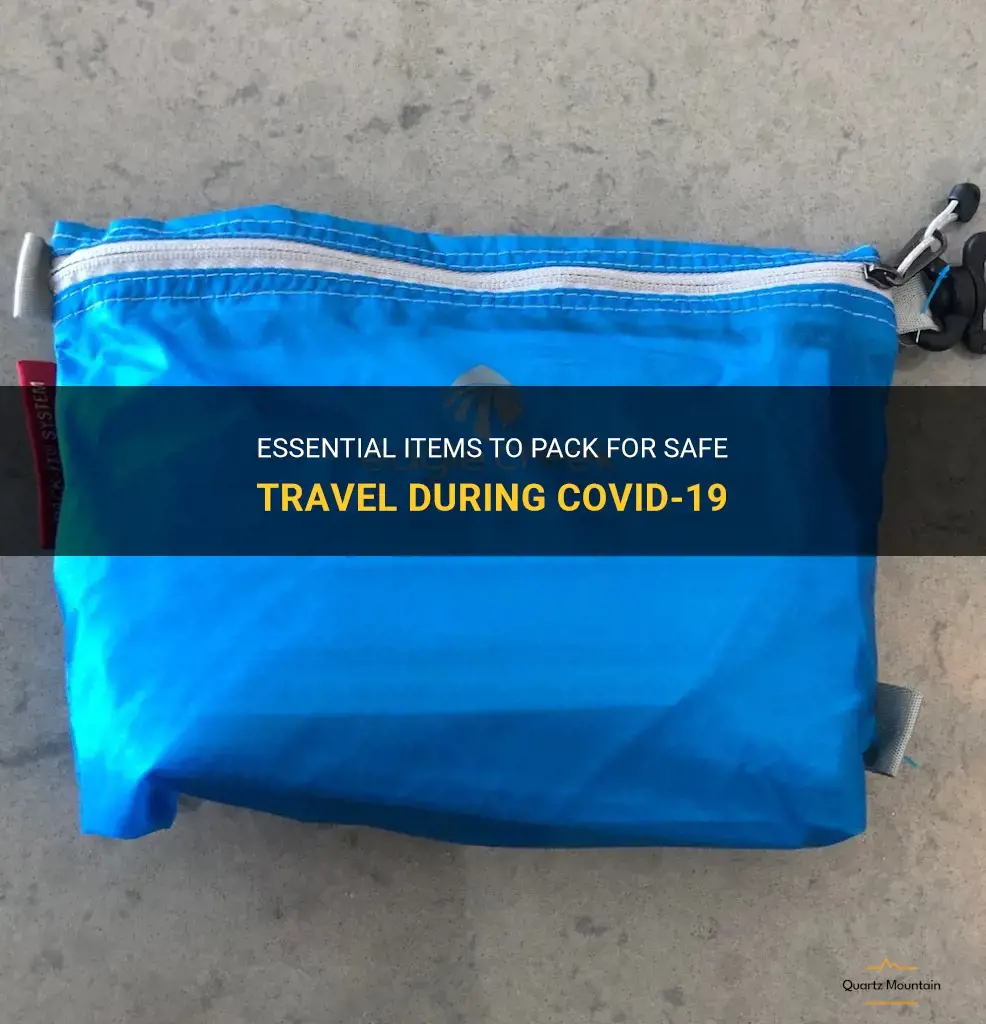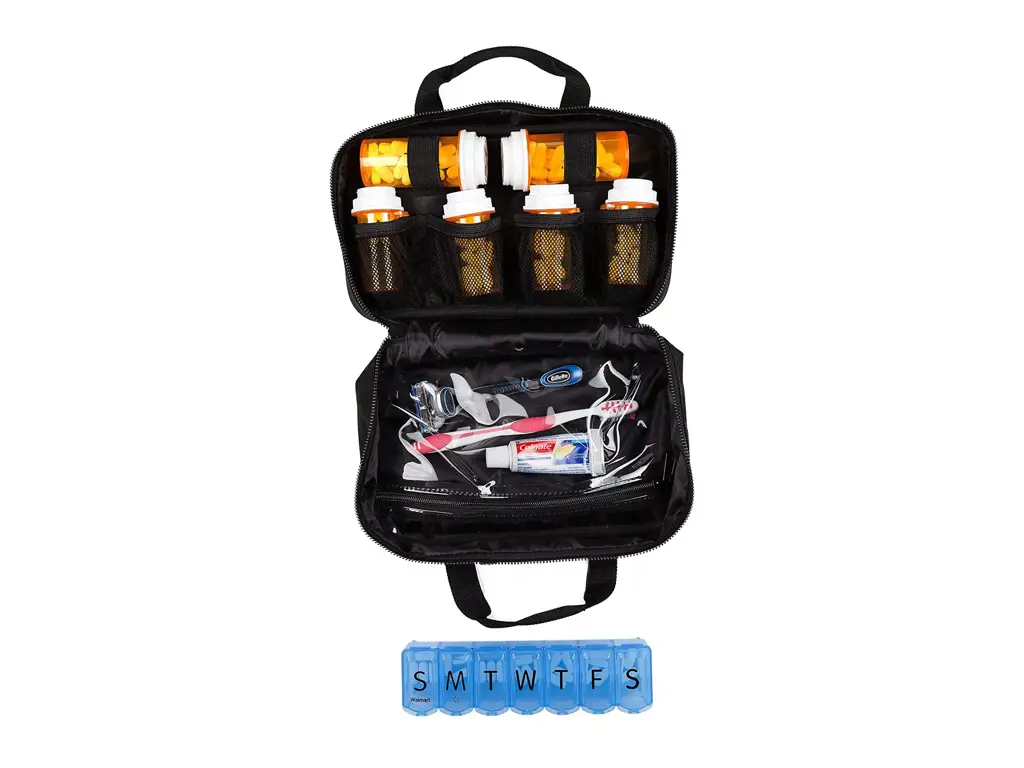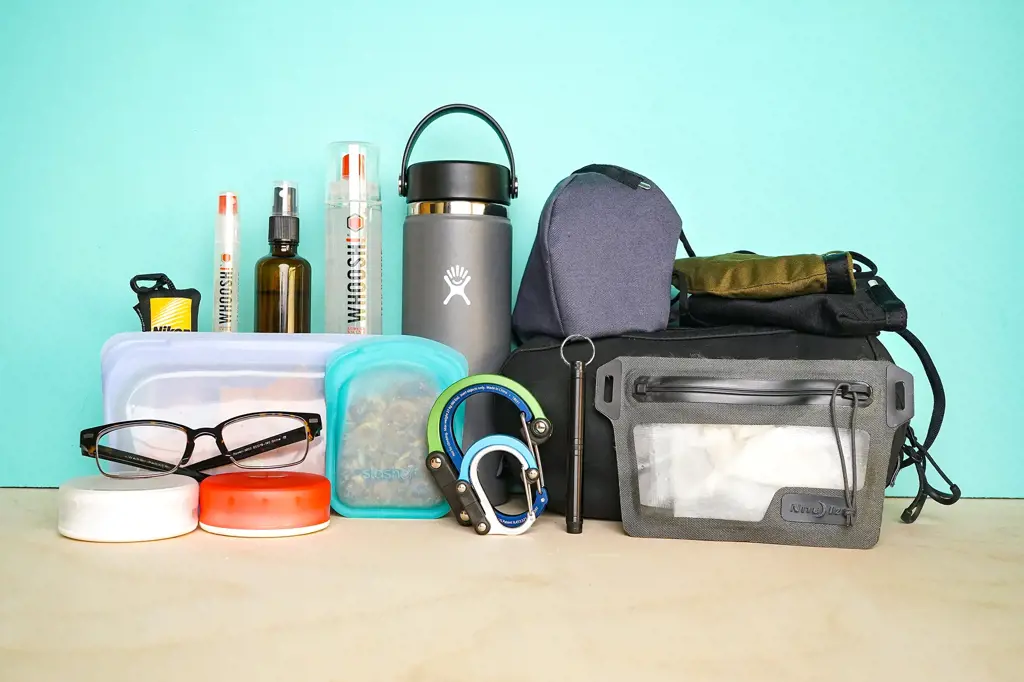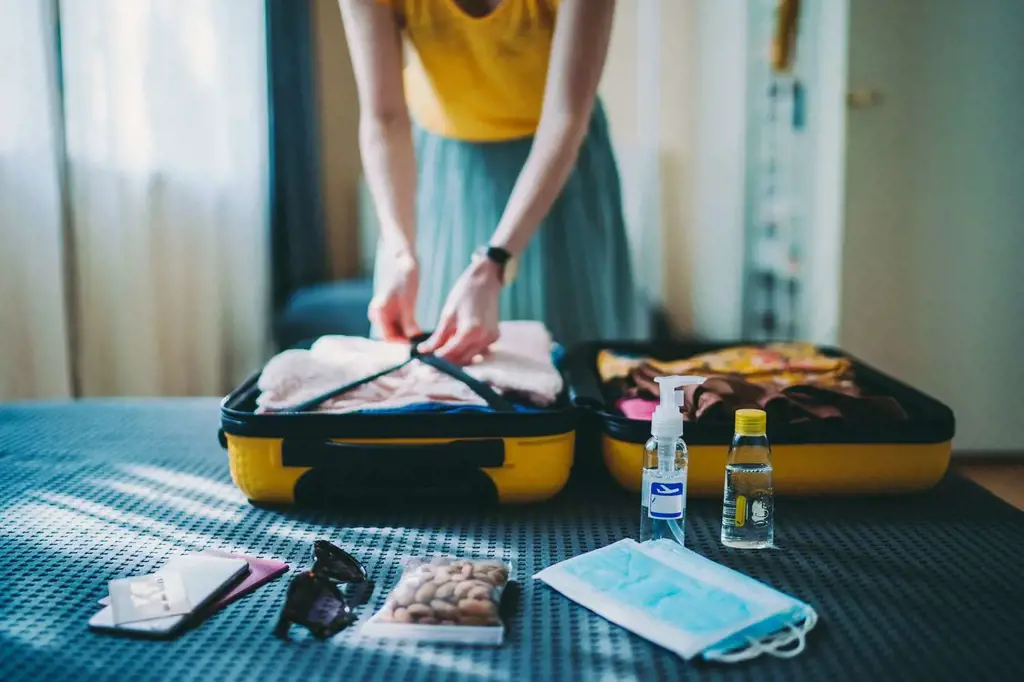
Traveling during the COVID-19 pandemic requires careful consideration and planning to ensure the safety of yourself and others. Alongside the usual essentials, such as passports, money, and clothes, it is now crucial to pack items that protect against the virus and promote good hygiene. In this article, we will explore the essential items you should pack for safe travel during COVID-19, helping you navigate these unprecedented times with confidence and peace of mind.
What You'll Learn
- What essential items should I pack for travel during COVID-19?
- Are there any specific items that are recommended for COVID-19 related travel precautions?
- How can I ensure that all the items I pack for travel are properly sanitized and safe to use?
- Are there any regulations or restrictions on what can be packed for travel during COVID-19?
- What are some additional items or precautions that are recommended for long-distance travel during the pandemic?

What essential items should I pack for travel during COVID-19?

In light of the ongoing COVID-19 pandemic, travel has become a more complicated endeavor. As you prepare for your trip, it's crucial to pack essential items to help keep you safe and minimize the risk of infection. Here are some key items to consider packing for travel during COVID-19:
- Face masks: Face masks have become an essential part of everyday life during the pandemic. Pack an adequate number of disposable or reusable masks to last the duration of your trip. Ensure they fit properly and cover both your nose and mouth.
- Hand sanitizer: Hand hygiene is crucial in preventing the spread of the virus. Carry a travel-sized bottle of hand sanitizer containing at least 60% alcohol. Use it frequently, especially when soap and water are not readily available.
- Disinfectant wipes: Bring disinfectant wipes to clean frequently touched surfaces, such as airplane trays, armrests, and hotel room doorknobs. Look for wipes specifically labeled as effective against viruses and bacteria.
- Thermometer: Packing a thermometer allows you to monitor your temperature and quickly identify any potential signs of illness. Having a reliable thermometer on hand can help you make informed decisions about seeking medical attention if necessary.
- Personal hygiene items: Don't forget to pack your regular personal hygiene items, such as toothbrush, toothpaste, shampoo, and soap. These items may not be readily available or may have limited options at your destination.
- Prescription medications: If you take prescription medications, bring an adequate supply for the duration of your trip. Carry them in their original packaging, along with a copy of your prescription, in case you need a refill.
- First aid kit: Include a basic first aid kit with items like band-aids, antiseptic ointment, pain relievers, and any specific medications you may need for common illnesses or injuries.
- Extra clothes and travel essentials: Pack extra clothes and essentials in case of unexpected delays or quarantine requirements. Carry a lightweight jacket, comfortable shoes, and any other items specific to your destination or activities.
- Electronic devices and entertainment: With travel restrictions and potential isolation, packing electronic devices, such as smartphones, tablets, and e-readers, can help keep you connected and entertained during your trip.
Remember to check the specific COVID-19 guidelines and requirements of your destination before you travel. Some destinations may have additional requirements, such as proof of vaccination or negative COVID-19 test results.
While these essential items can help protect you during your travels, it's important to continue practicing good hygiene and following local health guidelines. Maintain social distancing, avoid crowded places, and comply with mask mandates to reduce the risk of infection.
By packing these essential items and staying informed about the latest COVID-19 updates, you can make your travel experience safer and more enjoyable during these unprecedented times.
Tips for Packing for Africa: Advice from Reddit Users
You may want to see also

Are there any specific items that are recommended for COVID-19 related travel precautions?

As the world continues to grapple with the ongoing COVID-19 pandemic, travel precautions have become more important than ever. Whether you have an upcoming trip or are planning to travel in the future, there are specific items that are recommended for COVID-19 related travel precautions. These items can help protect yourself and others from the spread of the virus and ensure a safer travel experience.
- Face masks: Wearing a face mask is one of the most important precautions you can take while traveling during the COVID-19 pandemic. It helps prevent the spread of respiratory droplets that may contain the virus. It is recommended to wear a well-fitted mask that covers your nose and mouth, such as a surgical mask or a cloth mask with multiple layers.
- Hand sanitizer: Carrying a travel-sized hand sanitizer is crucial for maintaining hand hygiene. Look for a sanitizer that contains at least 60% alcohol, as this is effective in killing germs and viruses. Use it frequently, especially after touching surfaces such as doorknobs or handrails, and before eating or touching your face.
- Disinfectant wipes: It's a good idea to bring disinfectant wipes and use them to clean high-touch surfaces such as tray tables, armrests, and seat belts on planes or public transportation. This extra precaution can help reduce the risk of coming into contact with the virus.
- Thermometer: Having a thermometer on hand can be useful for monitoring your temperature. It's important to check for symptoms such as fever, as it is one of the common indicators of COVID-19. If you develop a high temperature or other symptoms, it's best to seek medical advice and avoid traveling if possible.
- Extra masks and gloves: Bringing extra masks and gloves is always a good idea, especially for long journeys or if you anticipate needing to change them throughout your travel. This ensures that you have a fresh and clean mask and gloves, reducing the risk of contamination.
- Travel-sized soap: While hand sanitizers are convenient, it's also important to wash your hands thoroughly with soap and water whenever possible. Bringing a travel-sized soap can be useful, especially in situations where access to soap and water is limited.
- Digital thermometer and pulse oximeter: In addition to a regular thermometer, a digital thermometer and pulse oximeter can provide additional health monitoring. These devices can help check your oxygen levels and detect potential signs of COVID-19.
- Personal protective equipment (PPE): Depending on the type of travel and the level of risk, you may consider wearing additional PPE such as goggles or face shields. These can provide extra protection for your eyes and face, particularly in crowded or high-risk areas.
It's important to note that even with these precautions, it is still essential to follow local guidelines and regulations regarding travel and health safety. Stay updated on travel advisories, practice social distancing, and avoid crowded areas whenever possible. By taking these specific items and recommendations into account, you can help mitigate the risk of contracting or spreading COVID-19 while traveling.
Essential Tips for Packing the Perfect Dinner On-The-Go
You may want to see also

How can I ensure that all the items I pack for travel are properly sanitized and safe to use?

In light of the ongoing pandemic, ensuring that all the items we pack for travel are properly sanitized and safe to use has become more important than ever. Whether you are traveling by air, car, or any other means, it is crucial to take proper precautions to avoid any potential risk of infection. Here are some steps you can follow to ensure that all your travel essentials are properly sanitized and safe to use.
- Prepare a sanitization kit: Before you start packing, gather all the necessary supplies for sanitizing your items. This may include disinfectant wipes, hand sanitizer, disposable gloves, and face masks. Having these items readily available will make the sanitization process much easier and more convenient.
- Clean and disinfect your luggage: Begin by cleaning and disinfecting your luggage. Start with wiping down the exterior surfaces of your suitcases or backpacks using disinfectant wipes. Pay special attention to the handles, zippers, and wheels. For hard-shell luggage, you can also consider using a disinfectant spray to reach crevices and corners.
- Wash and sanitize your clothes: Before packing your clothes, make sure to wash them thoroughly. Follow the washing instructions on the garment labels and use an appropriate detergent. To further sanitize your clothes, you can add a disinfectant laundry additive or use a high-temperature setting if applicable. Once dry, fold and pack them into sealable plastic bags to maintain their cleanliness during the journey.
- Sanitize personal items: Items such as toiletries, electronics, and accessories should also be properly sanitized. Use disinfectant wipes or a mixture of alcohol and water to clean the surfaces of your phone, tablet, headphones, and other electronic devices. For toiletries like toothbrushes and hairbrushes, consider using a UV light sterilizer or washing them with soap and hot water.
- Pack essentials in separate bags: Organize your belongings by packing them into separate bags or pouches. This helps to minimize contact between different items and makes it easier to sanitize specific items if needed. For example, you can pack your toiletries in a separate bag from your clothes or place your electronics in a padded sleeve within your backpack.
- Sanitize high-touch items during travel: While traveling, certain items, such as your passport, wallet, and travel documents, may be frequently touched. Wipe these items with disinfectant wipes regularly to maintain their cleanliness. Also, ensure that you have easy access to hand sanitizer for regular use.
- Maintain personal hygiene practices: Apart from sanitizing your belongings, it is important to maintain personal hygiene practices throughout your journey. Regularly wash and sanitize your hands, wear a face mask when required, and practice social distancing whenever possible.
Remember, the key to ensuring that all the items you pack for travel are properly sanitized and safe to use lies in being proactive and consistent in your sanitization efforts. By following these steps, you can minimize the risk of spreading or contracting any infections during your travels. Stay safe and enjoy your journey!
The Ultimate Packing Guide for a Memorable Week in Tuscany
You may want to see also

Are there any regulations or restrictions on what can be packed for travel during COVID-19?

Title: Regulations and Restrictions on Travel Packing During COVID-19
Introduction:
As the world continues to navigate the COVID-19 pandemic, travelers must stay updated on the regulations and restrictions regarding what can be packed for travel. It is crucial to pack essential items while also adhering to safety guidelines to minimize the risk of spreading the virus. This article provides a comprehensive overview of the current regulations and restrictions on travel packing during COVID-19, ensuring a safe and worry-free travel experience.
Understanding the Regulations and Restrictions:
Size and Weight Limitations:
While COVID-19 has brought about various changes to travel protocols, the size and weight limitations for luggage generally remain the same. Airlines and transportation providers typically have guidelines in place for the size and weight of both check-in and carry-on luggage. However, it is advisable to check with the specific airline or transportation provider for any COVID-19 related updates or restrictions.
Personal Protective Equipment (PPE):
PPE, including face masks, gloves, and hand sanitizers, has become a crucial part of travel packing during the pandemic. Many airlines and countries may require individuals to wear masks during the entire travel duration, including at airports, onboard flights, and in public spaces. It is essential to pack an adequate supply of masks, gloves, and sanitizers to ensure compliance with safety regulations.
Sanitization Products:
While traveling during COVID-19, maintaining hygiene and cleanliness is of utmost importance. In addition to personal sanitization supplies, it is advisable to carry disinfectant wipes, sanitizing sprays, and travel-sized hand sanitizers. These products can be used to clean surfaces such as tray tables, armrests, and door handles to minimize the risk of exposure to the virus.
Medications and First Aid:
It is essential to pack necessary medications and a small first aid kit to address any minor health concerns during travel. Additionally, travelers should consider carrying a thermometer to monitor their own temperature regularly. If any symptoms arise, it is crucial to seek medical assistance and follow local health guidelines.
Electronics and Entertainment:
With increased travel restrictions and reduced in-flight services, it is advisable to pack personal electronics, such as tablets, e-readers, or laptops, for entertainment purposes. These devices can help pass the time during long flights or layovers without the need to rely on shared onboard entertainment systems.
Food and Snacks:
As food services on airlines may be limited or restricted during the pandemic, it is a good idea to pack some snacks or light meals. However, it is important to note that some countries have restrictions on bringing food items across borders, so it is essential to check the latest regulations before packing any perishable food items.
While travel during COVID-19 requires additional precautions, packing for a safe and successful trip is still manageable. Ensure you are up-to-date with the regulations and restrictions imposed by airlines, local authorities, and countries you are traveling to and from. Prioritize personal protective equipment, sanitization products, essential medications, and entertainment devices to make your journey comfortable and safe. Adapting to the new travel norms and being responsible can help minimize the spread of COVID-19 and make travel enjoyable even in these challenging times.
Essential Items to Pack for a Trip to Denver
You may want to see also

What are some additional items or precautions that are recommended for long-distance travel during the pandemic?

During the COVID-19 pandemic, travel has become more challenging and presents additional risks. However, if you need to travel long-distance, there are several additional items and precautions that are recommended to ensure your safety and minimize the spread of the virus.
- Face masks: It is essential to wear a face mask at all times during your journey, especially when in close proximity to others. Choose a mask that fits well and provides adequate coverage for your nose and mouth. Bring several extra masks in case you need to change them throughout your trip.
- Hand sanitizer: Carry a bottle of hand sanitizer with at least 60% alcohol content. Use it frequently to sanitize your hands, especially after touching surfaces in public areas like airports or train stations.
- Disinfectant wipes: Pack a travel-sized pack of disinfectant wipes to clean frequently touched surfaces such as armrests, tray tables, and seat belts. Use them to wipe down surfaces before you touch them to reduce the risk of transmission.
- Snacks and drinks: To minimize the need to remove your mask or interact with others, bring your own snacks and drinks. Choose pre-packaged options that are easy to eat and drink without removing your mask.
- Travel-sized toiletries: Avoid using communal toiletries in hotels or other accommodations. Pack your own travel-sized toiletries, including hand soap, shampoo, and body wash, to minimize contact with shared items.
- Digital travel documents: Whenever possible, opt for digital versions of your travel documents. Use electronic boarding passes, hotel confirmations, and any other travel-related documents to reduce contact with physical items.
- Contactless payments: Use contactless payment methods, such as mobile wallets or credit cards, to minimize the need to handle cash or touch payment terminals.
- Plan rest stops carefully: If you need to make pit stops during your journey, plan ahead and choose locations that have established hygiene protocols. Look for rest stops with clean restroom facilities and takeout options for dining.
- Maintain social distancing: Even during travel, it is important to maintain a safe distance of at least six feet from others whenever possible. Avoid crowded areas and be mindful of your surroundings.
- Follow local guidelines: Different areas may have varying regulations and guidelines related to COVID-19. Before you travel, check the local health department's website or consult trusted sources for information on travel restrictions, quarantine requirements, and any other relevant guidelines.
Remember, the best way to minimize the risk of COVID-19 transmission during travel is to limit the frequency and duration of your trips. If possible, opt for virtual meetings or remote work options instead of traveling. However, if travel is necessary, follow these additional items and precautions to help protect yourself and others during these challenging times.
Essential Items to Pack for Your Trip to Airlie Beach
You may want to see also
Frequently asked questions
When traveling during the COVID-19 pandemic, it is crucial to pack essential items that prioritize your health and safety. These include face masks, hand sanitizers, disinfectant wipes, and a personal thermometer. Having these items readily available will help protect you and others around you while on your journey.
Yes, it is advisable to pack extra face masks and hand sanitizers. These items may not always be readily available during your travels, especially if you are traveling to remote areas or visiting destinations with limited resources. Packing extra face masks and hand sanitizers will ensure that you have an adequate supply throughout your trip and reduce the risk of running out.
In addition to the essential items mentioned earlier, there are a few more items you should consider packing. These include disposable gloves, travel-sized disinfectant sprays, and extra clothing. Disposable gloves can provide an extra layer of protection when handling objects in public spaces. Travel-sized disinfectant sprays can be used to sanitize surfaces in your hotel room or public transportation. Packing extra clothing allows you to change and wash your clothes more frequently, reducing the chances of contamination.







